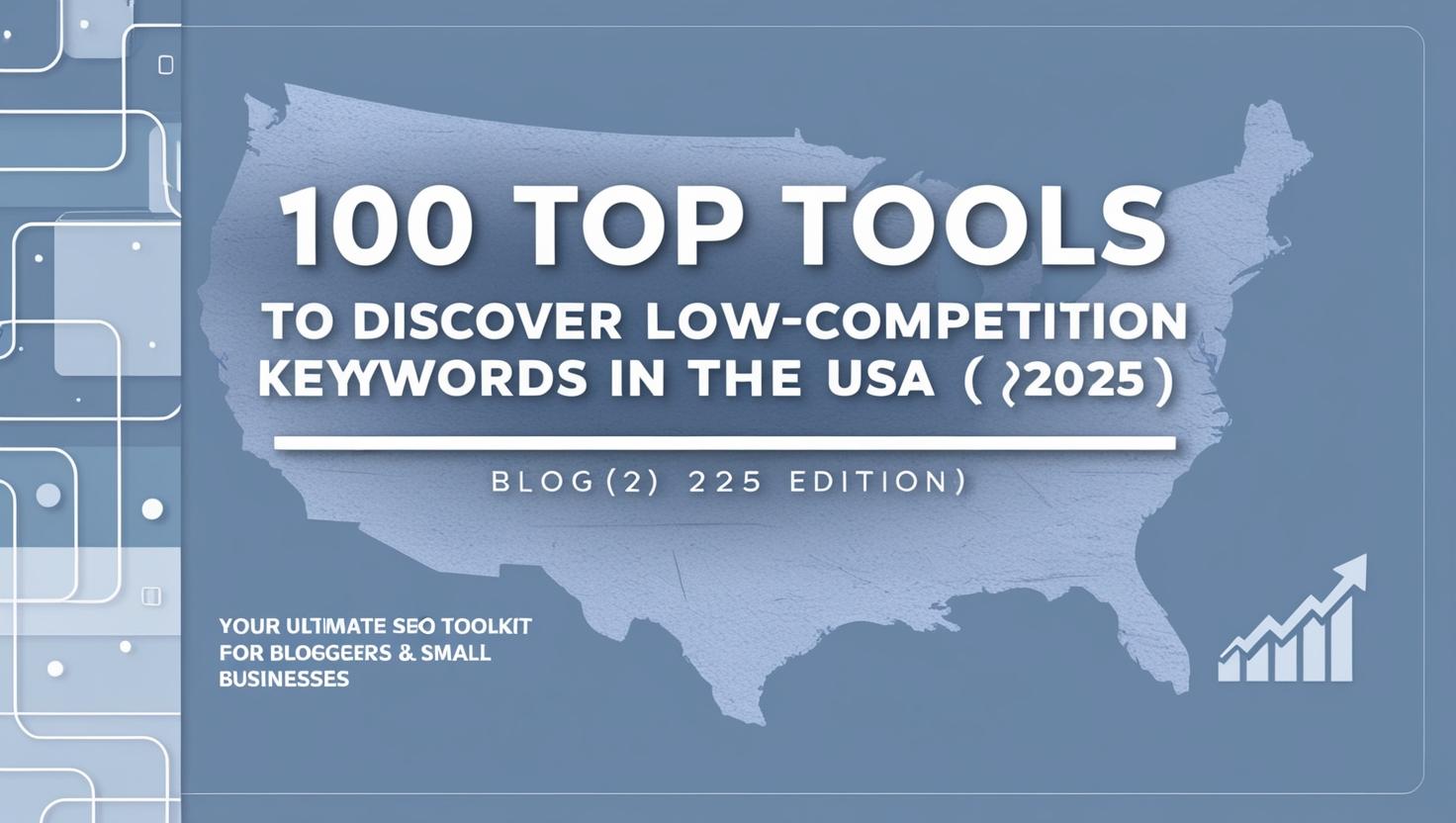Introduction: Unlock Google Rankings with Smart Keyword Research
Want to land on the first page of Google without spending thousands on ads or hiring a high-end SEO agency? You need to start with the right low-competition keywords.
In this all-in-one guide, we reveal 100 proven tools to help you dominate keyword research in the USA for 2025. Whether you’re a blogger, small business, or digital marketer, these tools will help you uncover search terms that are easy to rank for—and more likely to convert.
Imagine this: You publish a blog post, and within days, it ranks on page one. That’s the power of choosing the right keywords. Let’s show you how to do it.
What Are Low-Competition Keywords? (Quick Definition for Snippets)
Low-competition keywords are search queries with fewer websites competing for them in Google’s search results. These terms are easier to rank for, especially for new websites, small businesses, and content creators.
Why Low-Competition Keywords Matter in the USA (2025 SEO Landscape)
Here’s why you should focus on low-competition keywords:
- ✅ Faster rankings for newer websites
- ✅ Lower CPC in paid advertising like Google Ads
- ✅ Easier entry into niche and local markets
- ✅ Better ROI for bloggers and small businesses
- ✅ Increased organic traffic with less effort
These keywords are especially valuable for USA-based content due to local SEO opportunities, regional search trends, and geographic modifiers.
How to Find Low-Competition Keywords (Step-by-Step Guide)
Step 1: Choose a Niche or Topic
- Start with a broad idea
- Use Google Trends, AnswerThePublic, or Exploding Topics for trending subjects
Step 2: Identify Seed Keywords
- Think like your audience: What would they search for?
- Use Google Autocomplete, People Also Ask, and Reddit to brainstorm
Step 3: Research Keyword Metrics
- Plug seed keywords into tools like Ubersuggest, Ahrefs, or KWFinder
- Look for:
- Low keyword difficulty (KD)
- Decent monthly search volume
- High click-through potential
Step 4: Analyze the SERPs (Search Engine Results Pages)
- Check who’s already ranking
- If weak domains or forums dominate the top 10, you have a good opportunity
Step 5: Find Long-Tail Variations
- Add modifiers: “near me,” “2025,” “best for beginners”
- Long-tail keywords are easier to rank and target more specific search intent
Step 6: Organize Keywords into Clusters
- Use keyword clustering tools to create topic groups
- Build pillar content with internal linking between supporting articles
Step 7: Monitor and Improve
- Track rankings using Google Search Console, SERanking, or SEMrush
- Refresh or update underperforming content every 2-3 months
Avoid These Common Keyword Research Mistakes
- Targeting only high-volume keywords
- Ignoring user intent behind the search
- Skipping local keyword opportunities (e.g., “web design New York”)
- Relying on outdated tools with no USA data
- Failing to analyze the current SERP competition
- Keyword stuffing (hurts rankings and readability)
- Not updating keyword strategy regularly
The Ultimate List: 100 Tools to Find Low-Competition Keywords in the USA
🟢 Free & Freemium Tools for Beginners
- Google Keyword Planner
- Ubersuggest (Free version)
- Google Trends
- AnswerThePublic
- Keywords Everywhere (free mode)
- Soovle
- Google Search Console
- WordStream Free Keyword Tool
- Moz Keyword Explorer (free plan)
- Keyword Surfer
- Bing Webmaster Tools
- SEOStack Keyword Tool
- Google Autocomplete
- People Also Ask Scraper
- Ahrefs Free Keyword Generator
- Keyword Sheeter
- Twinword Ideas
- Keyworddit
- Google Related Searches
- AlsoAsked.com
💼 Paid Tools with Advanced Features
- Ahrefs
- SEMrush
- Moz Pro
- Ubersuggest Pro
- KWFinder (by Mangools)
- Serpstat
- LongTailPro
- SpyFu
- LowFruits.io
- Jaaxy
- SEO PowerSuite
- SE Ranking
- MarketMuse
- CognitiveSEO
- Screaming Frog SEO Spider
- Wordtracker
- Content Harmony
- WebCEO
- BrightEdge
- Conductor Searchlight
🎯 Niche & Long-Tail Keyword Tools
- Thruuu SERP Analyzer
- Topic Mojo
- KeywordsIn.com
- Keyword Tool Dominator
- Seed Keywords
- Bulk Keyword Generator
- Google Ads Forecast Tool
- Competitor keyword spy tools
- Keyword Cupid
- Frase.io
🗺️ USA & Local SEO Keyword Tools
- LocalFalcon
- BrightLocal
- Yext
- Whitespark
- GeoRanker
- Grid My Business
- Local Viking
- Places Scout
- Moz Local
- KeywordTool.io “Near Me” Search
🤖 AI-Driven Keyword & SEO Assistants
- ChatGPT keyword prompt templates
- Jasper AI + SurferSEO
- Copy.ai (SEO feature)
- Outranking.io
- NeuronWriter
- Scalenut
- Dashword
- ContentBot.ai
- Clearscope
- InkForAll
🧠 Topic Clustering & Niche Discovery Tools
- NicheFinder.io
- Micro Niche Finder
- ClusterAi
- KeyClusters
- KeywordInsights.ai
- Linkgraph
- Similarweb
- RankIQ
- Blogely
- WriterZen
🔬 Competitor Analysis & SERP Research Tools
- Similarweb
- BuzzSumo
- SerpWoo
- BuiltWith
- Traffic Travis
- Wappalyzer
- ClickFlow
- NinjaOutreach
- ContentKing
- SERPWoo
🔌 Browser Extensions
- Keywords Everywhere (premium)
- SEOquake
- MozBar
- Ubersuggest Chrome Extension
- SurferSEO Plugin
- SERPTrends
- Ahrefs Toolbar
- Similarweb Extension
- Detailed SEO Extension
- Keyword Surfer Pro
Some Explanation and 20 best Tools
1. Google Keyword Planner
- Free, reliable, and a good starting point
- Great for US-based PPC data
2. Ubersuggest
- Keyword suggestions, difficulty scores, and content ideas
- Best for beginners
3. Ahrefs Keyword Explorer
- In-depth competition and SERP analysis
- Powerful for competitive niches
4. SEMrush
- Comprehensive keyword and SEO suite
- Excellent for low-competition keyword filters
5. Keywords Everywhere
- Chrome extension for real-time keyword data
- Perfect for quick research while browsing
6. Moz Keyword Explorer
- Prioritizes keyword opportunity and potential
- Beginner-friendly UX
7. LongTailPro
- Specializes in long-tail keywords
- Score-based competition checker
8. KWFinder
- Visual UI, accurate keyword difficulty, localized data
9. AnswerThePublic
- Visualize content ideas and user questions
- Great for finding content gaps
10. Soovle
- Keyword suggestions from multiple platforms (Google, Bing, Amazon)
11. SpyFu
- Competitor keyword strategy insights
- Uncover gaps they missed
12. WordStream Free Keyword Tool
- Quick, beginner-friendly keyword ideas
13. Serpstat
- Useful for bulk keyword research and analysis
14. Google Trends
- Compare keyword popularity over time in the USA
15. SurferSEO
- Combines content optimization with keyword data
16. LowFruits.io
- Built for low-competition keyword hunters
17. KeywordTool.io
- Generates keyword ideas from autocomplete
18. Jaaxy
- Keyword competition score + affiliate SEO tool
19. Thruuu
- Detailed SERP analyzer to check keyword difficulty
20. Google Search Console
- Find keywords you’re already ranking for (and optimize further)
Internal Links to Related SEO Blogs
FAQs: Low-Competition Keyword Research in the USA
1. What are the top free tools to find low-competition keywords?
Try Google Keyword Planner, Ubersuggest, AnswerThePublic, Keyword Surfer, and Moz Free Tools.
2. How do I know if a keyword is easy to rank for?
Check keyword difficulty (KD), the strength of competing domains, and whether the current content on page one is well-optimized.
3. Can I find “zero-competition” keywords?
Yes. Use tools like LowFruits.io, Ubersuggest, or Keyword Cupid to discover hidden gems.
4. Should I use paid keyword tools as a beginner?
Start with free tools. Upgrade when you need advanced features like clustering, competitor research, and trend analysis.
5. How often should I update my keyword list?
Review your keyword strategy every 2–3 months based on performance in Google Search Console or analytics tools.
Final Thoughts: Rank Smarter with the Right Keyword Tools
Choosing the right keywords is half the SEO battle. With these 100 tools, you’ll unlock better visibility, higher rankings, and smarter content planning—all without needing to be a full-time SEO expert.
✅ Call to Action
Start exploring these keyword research tools today and bookmark this list for future reference. For more actionable SEO insights, visit WebWriteTech.com—your trusted partner in content marketing and growth.

